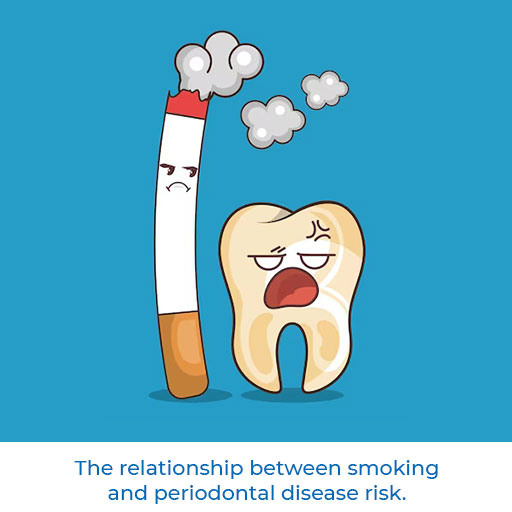
Smoking, a habit embraced by millions around the world, has been unequivocally linked to numerous health hazards. While its detrimental impact on respiratory and cardiovascular systems is well-documented, the connection between smoking and periodontal disease often goes unnoticed. Periodontal disease, a severe form of gum disease, can lead to tooth loss and various oral health complications. In this blog, we delve into the intricate relationship between smoking and periodontal disease risk, shedding light on the alarming consequences of this detrimental habit.
The Underlying Mechanisms:
To understand the correlation between smoking and periodontal disease, it is essential to explore the underlying mechanisms. Smoking weakens the body’s immune system, making it more difficult for the body to fight off infections, including those affecting the gums. Additionally, tobacco use diminishes blood flow to the gums, impairing the delivery of essential nutrients and oxygen required for maintaining healthy gum tissue. Moreover, smoking reduces saliva production, which plays a crucial role in washing away bacteria and buffering the acids that cause tooth decay and gum disease. These combined effects create an environment conducive to the growth of harmful bacteria and increase the risk of developing periodontal disease.
The Impact of Smoking on Periodontal Disease Risk :
Research has demonstrated that smokers are two to three times more likely to develop periodontal disease compared to non-smokers. Smoking also affects the severity and progression of the disease. Studies have revealed that smokers experience more bone loss and faster progression of gum disease compared to non-smokers. Additionally, smokers are less responsive to periodontal treatments and have a higher risk of treatment failure and tooth loss. The harmful effects of smoking on periodontal health are dose-dependent, meaning that the more cigarettes a person smokes per day and the longer they have been smoking, the greater their risk of developing periodontal disease.
Quitting Smoking: A Vital Step towards Oral Health:
Although the statistics may seem disheartening, there is hope. Quitting smoking is crucial for improving periodontal health and reducing the risk of gum disease. Research has shown that former smokers have a similar risk of developing periodontal disease to those who have never smoked. Quitting smoking allows the body’s immune system to regain strength, blood flow to the gums to improve, and saliva production to normalize. Dental professionals can provide guidance and support to individuals who wish to quit smoking and improve their oral health.
Conclusion :
Smoking and periodontal disease share a distressing relationship. By understanding the underlying mechanisms and recognizing the heightened risk, individuals can make informed decisions about their oral health. Quitting smoking is a vital step towards preventing and treating periodontal disease, promoting a healthier smile and overall well-being.
We hope you have received all the necessary information; for additional information, please visit our blog section or call us at (267) 908-4867.









